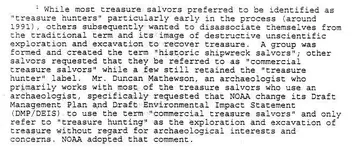Under the Abandoned Shipwreck Act of 1987 (ASA), a state acquires title to all abandoned vessels embedded within its submerged lands. In defining the term abandoned, the ASA merely provides that abandonment occurs the moment an owner relinquishes its rights to a sunken vessel. On appeal to the Fourth Circuit, Virginia and Sea Hunt argued that the ASA's definition of abandonment should permit a court to imply abandonment where a sovereign fails to declare its ownership in a timely manner. The Fourth Circuit disagreed, holding that, as under admiralty law, a sovereign owner appearing before a court to assert its ownership to a shipwreck retains title to the vessel unless an express and affirmative declaration of abandonment is proven.
The Fourth Circuit applied the express abandonment standard to the 1763 Treaty and determined that Spain had not relinquished its rights to LA GALGA. First, although Article XX of the treaty contains "sweeping language of Spain's cession," it never explicitly refers to vessels, warships, shipwrecks, or frigates. Since the treaty contains a detailed catalogue of "non-territorial state property" to be conveyed, but does not include shipwrecks, the Fourth Circuit concluded that Spain had not expressly abandoned its title to the vessels. Likewise, Article XX expressly limits the cession to Spanish property located "on the continent of North America." The specificity of this territorial limit convinced the court that the shipwrecks were not part of the cession since they were located on the seabed.
Next, the court noted that Article XX grants the King of Spain an unlimited amount of time to retrieve his personal property; the other provisions of the treaty specifically set time limits on similar actions. Therefore, absent an affirmative act of abandonment, Spain could retrieve the vessels at any time.
Finally, both Spain and Great Britain agreed that the vessels were not included under Article XX. When the parties to a treaty agree to the interpretation of its provisions, the courts must defer to the parties' understanding unless there is "extraordinarily strong contrary evidence." The court was bound by Spain and Great Britain's interpretation since Virginia and Sea Hunt were unable to rebut.
In concluding that Spain retained its right to both LA GALGA and JUNO, the Fourth Circuit emphasized that anything short of an affirmative act of abandonment will undermine a state's or private salvage company's claim to a sovereign shipwreck. This decision stresses that, as under customary international law, sovereign shipwrecks should be protected from unauthorized interference.
Adams Onis Treaty
It was also noted that the Treaty of 1903 between the US and Spain, (after the explosion of the USS Maine), protected the Nations rights to their warships when sunk in foreign waters.
The Adams* Onís Treaty sometimes referred to as The Florida Treaty was signed in Washington on February 22, 1819 and ratified by Spain October 24, 1820 and entered into force February 22, 1821. It terminated April 14,1903 by a treaty of July 3, 1902.
Treaty of 1903
ARTICLE X
In cases of shipwreck, damages at sea, or forced putting in, each party shall afford to the vessels of the other, whether belonging to the State or to individuals, the same assistance and protection and the same immunities which would have been granted to its own vessels in similar cases.
Article X was cited in the Juno/La Galga case. The treaty superseded the Adams/Onis Treaty. Note it states belonging to the State or to individuals.







